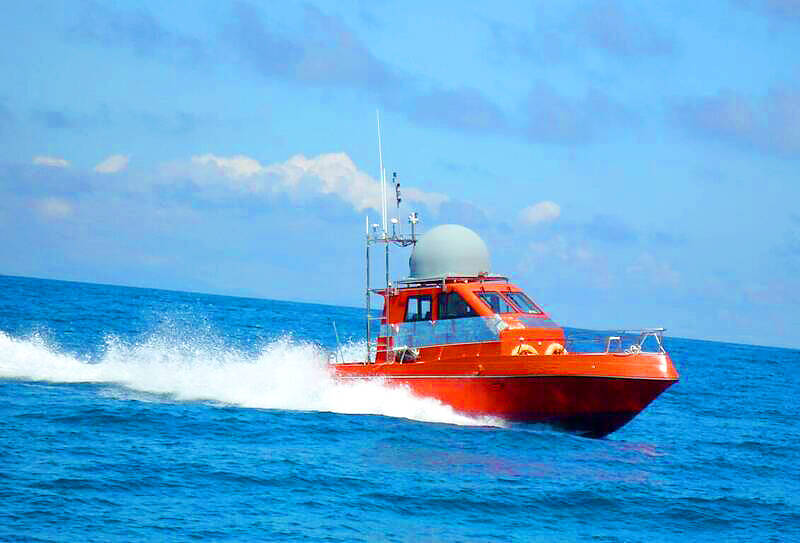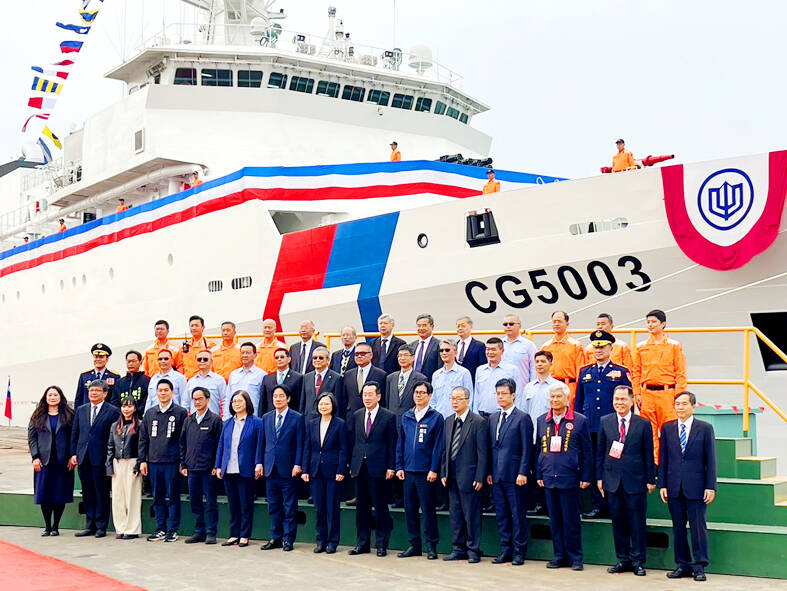The army is considering buying 200 armed sea drones after the Chungshan Institute of Science and Technology begins mass production in 2026, a source said yesterday.
The institute has said that it is developing armed target drones with sonar, radar and weapon modules, which would serve as multipurpose uncrewed boats that can perform coastal defense missions, strikes, and detect submarines and mines.
The army and navy have expressed interest in the uncrewed boat program, with the former estimating that it could use 200 of the vessels, a defense official familiar with the matter said, speaking on condition of anonymity.

Photo: Screen grab from the institute’s Web site
The army believes that armed sea drones could effectively counter or deter Chinese People’s Liberation Army Navy warships and landing craft near Taiwan, the official said.
Meanwhile, the navy believes it could use the drones to carry out raids against Chinese navy ships, they said, adding that the limited range of the autonomous watercraft could be improved by releasing them from larger naval vessels.
Sea drones, mainly those loaded with explosives to strike targets, are utilized extensively by the Ukrainian armed forces against Russians, with one reportedly sinking the Sergey Kotov on Sunday last week.

Photo: CNA
Meanwhile, President Tsai Ing-wen (蔡英文) and Vice President William Lai (賴清德), the president-elect, attended a ceremony marking the respective delivery and christening of the Coast Guard Administration’s 4,000-tonne Chiayi-class offshore patrol vessels Yunlin and Taipei.
The event was held at CSBC Corp, Taiwan’s (台灣國際造船) shipyard in Kaohsiung.
Local media interpreted the presence of Tsai and Lai at the ceremony as a move to boost morale among coast guard officers amid political furor revolving around the capsizing last month of a Chinese boat attempting to evade the coast guard off Kinmen County. Two Chinese fishers died in the incident.
Tsai refrained from commenting on the incident and did not take questions from reporters, but said in her address that the coast guard has Taiwan’s thanks for “standing steadfast at their post and defending the nation’s sovereign waters.”
The construction of the patrol vessels — which have boosted the nation’s indigenous shipbuilding sector, economy and the coast guard’s capabilities — is part of the nation’s indigenous shipbuilding program, she said.
The domestic manufacturing of warships and patrol vessels is key to conveying Taiwan’s commitment to safeguarding freedom and democracy to the world, she added.
The Yunlin and Taipei are respectively the third and fourth ship of their class, a cutter-type vessel that displaces 5,000 tonnes when fully equipped with 70mm rockets, 20mm guns, water cannons, a helipad and a field hospital.
The government has set aside NT$42.6 billion (US$1.4 billion) for an initiative to boost the local shipbuilding industry and beef up Taiwan’s maritime patrol capacity.
According to the Ocean Affairs Council, 141 coast guard ships are to be built by 2027 under the initiative, which began in 2018.
Additional reporting by CNA

The Central Election Commission has amended election and recall regulations to require elected office candidates to provide proof that they have no Chinese citizenship, a Cabinet report said. The commission on Oct. 29 last year revised the Measures for the Permission of Family-based Residence, Long-term Residence and Settlement of People from the Mainland Area in the Taiwan Area (大陸地區人民在台灣地區依親居留長期居留或定居許可辦法), the Executive Yuan said in a report it submitted to the legislature for review. The revision requires Chinese citizens applying for permanent residency to submit notarial documents showing that they have lost their Chinese household record and have renounced — or have never

A magnitude 5.6 earthquake struck off the coast of Yilan County at 12:37pm today, with clear shaking felt across much of northern Taiwan. There were no immediate reports of damage. The epicenter of the quake was 16.9km east-southeast of Yilan County Hall offshore at a depth of 66.8km, Central Weather Administration (CWA) data showed. The maximum intensity registered at a 4 in Yilan County’s Nanao Township (南澳) on Taiwan’s seven-tier scale. Other parts of Yilan, as well as certain areas of Hualien County, Taipei, New Taipei City, Taoyuan, Hsinchu County, Taichung and Miaoli County, recorded intensities of 3. Residents of Yilan County and Taipei received

Taiwan has secured another breakthrough in fruit exports, with jujubes, dragon fruit and lychees approved for shipment to the EU, the Ministry of Agriculture said yesterday. The Animal and Plant Health Inspection Agency on Thursday received formal notification of the approval from the EU, the ministry said, adding that the decision was expected to expand Taiwanese fruit producers’ access to high-end European markets. Taiwan exported 126 tonnes of lychees last year, valued at US$1.48 million, with Japan accounting for 102 tonnes. Other export destinations included New Zealand, Hong Kong, the US and Australia, ministry data showed. Jujube exports totaled 103 tonnes, valued at

BIG SPENDERS: Foreign investors bought the most Taiwan equities since 2005, signaling confidence that an AI boom would continue to benefit chipmakers Taiwan Semiconductor Manufacturing Co’s (TSMC, 台積電) market capitalization swelled to US$2 trillion for the first time following a 4.25 percent rally in its American depositary receipts (ADR) overnight, putting the world’s biggest contract chipmaker sixth on the list of the world’s biggest companies by market capitalization, just behind Amazon.com Inc. The site CompaniesMarketcap.com ranked TSMC ahead of Saudi Aramco and Meta Platforms Inc. The Taiwanese company’s ADRs on Tuesday surged to US$385.75 on the New York Stock Exchange, as strong demand for artificial intelligence (AI) applications led to chip supply constraints and boost revenue growth to record-breaking levels. Each TSMC ADR represents